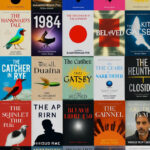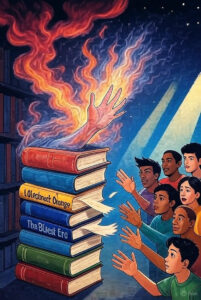In an era where stories shape identities and spark imaginations, a wave of book bans in U.S. schools is reshaping what young people can access—often under the banner of parental protection. Yet, amid the restrictions, public opposition is strong, highlighting a deep divide in how Americans view the role of literature in education.
 Dr. Rudine Sims Bishop, a pioneer in multicultural children’s literature, has long warned that when kids don’t see themselves in books—or encounter distorted representations—they internalize societal devaluation. “Stories tell us who we are and who we can become,” the provided insights emphasize, yet this “right to discover” is being curtailed in the name of protection.
Dr. Rudine Sims Bishop, a pioneer in multicultural children’s literature, has long warned that when kids don’t see themselves in books—or encounter distorted representations—they internalize societal devaluation. “Stories tell us who we are and who we can become,” the provided insights emphasize, yet this “right to discover” is being curtailed in the name of protection.
As Banned Books Week wrapped up earlier last week, a new report from PEN America reveals that despite a slight dip in numbers, censorship in classrooms remains alarmingly normalized, with thousands of titles pulled from shelves in the 2024-2025 school year.
School library shelves, once vibrant with colorful spines whispering tales of identity, courage, and discovery, now stand gutted and eerily quiet—books deemed ‘dangerous’ ripped away, robbing young readers of the spark of recognition, and leaving them yearning to see their truths reflected.

The PEN America Report
The Normalization of Book Banning, released on October 1, 2025, documents a staggering 6,870 instances of book bans across 87 public school districts in 23 states. This affected nearly 4,000 unique titles, a decline from the over 10,000 bans recorded the previous year.
The scale of this issue is alarming, and it’s not just the numbers that are concerning. ‘Censorship pressures have expanded and escalated,’ said Kasey Meehan, director of PEN America’s Freedom to Read program. ‘A disturbing ‘everyday banning’ and normalization of censorship has worsened and spread over the last four years.‘
Hotspots of Restriction
These bans aren’t evenly distributed across states; instead, they are skewed toward conservative states. Over 80 percent of the bans occurred in just three states—Florida, Texas, and Tennessee—driven by conservative advocacy groups, state laws like Florida’s HB 1069 (an expansion of the so-called “Don’t Say Gay” legislation), and local school board decisions. Florida has topped the list for three years running, with policies mandating district-wide reviews of materials. In contrast, more than two dozen states, including California, New York, and Washington, reported zero bans, bolstered by anti-censorship measures. Seattle, for instance, maintains unrestricted access through initiatives like the “Books Unbanned” program, offering free e-cards to teens nationwide via spl.org/BooksUnbanned.
What’s Being Targeted?
At the heart of the bans are LGBTQ+ representation, discussions of race and racism, and sexual content dominate the targeted works.Authors like Stephen King, Sarah J. Maas, and Jodi Picoult were among the most frequently targeted overall, echoing Cold War-era McCarthyism, where literature was scrutinized for ideological threats.
PEN America’s data shows that classics like Anthony Burgess’s A Clockwork Orange (banned in 23 districts) and Toni Morrison’s The Bluest Eye sit alongside young adult favorites such as Malinda Lo’s Last Night at the Telegraph Club and Sarah J. Maas’s A Court of Mist and Fury.
The top 10 most challenged books for the 2024-2025 school year:
- A Clockwork Orange by Anthony Burgess
- Breathless by Jennifer Niven
- Sold by Patricia McCormick
- Last Night at the Telegraph Club by Malinda Lo
- A Court of Mist and Fury by Sarah J. Maas
- Crank by Ellen Hopkins
- Forever… by Judy Blume
- The Perks of Being a Wallflower by Stephen Chbosky
- Wicked: The Life and Times of the Wicked Witch of the West by Gregory Maguire
- All Boys Aren’t Blue by George M. Johnson
 The Argument for Bans
The Argument for Bans
Proponents of these bans argue they safeguard children from “upsetting” content or ideologies outside the mainstream, framing the efforts as an extension of parental rights. A 2022 American Library Association (ALA) poll found that those supporting restrictions cited a need to protect youth from explicit material. However, critics contend this movement undermines students’ First Amendment rights and erases diverse voices.
A Coordinated Effort
The ALA’s complementary data for 2024 reports 821 formal challenges to 2,452 titles, with 72% originating from organized groups or government pressure rather than isolated parents. This aligns with PEN’s findings, noting a shift from individual complaints to coordinated campaigns. Federally, the Trump administration in 2025 has influenced removals in Department of Defense schools, aligning with broader conservative education policies.
 Fighting Back Against Censorship
Fighting Back Against Censorship
Resistance is mounting. Lawsuits, such as PEN America’s case against Rutherford County, Tennessee, challenge these restrictions, while states like Illinois, Minnesota, and New Jersey have enacted laws banning book bans outright. Banned Books Week, held October 5-11, adopted the theme “Censorship Is so 1984. Read for Your Rights,” drawing parallels to George Orwell’s dystopian novel about oppressive regimes. Launched in 1982, amid a surge in challenges, the week celebrates the freedom to read while spotlighting censorship in libraries, schools, and bookstores.
Public Sentiment and Future Trends
Public sentiment essentially sides against bans. The 2022 ALA poll of 1,000 Americans showed 71 percent opposing such efforts. This underscores a national disconnect from the concentrated actions in red states. As new laws in South Carolina and Utah ramp up restrictions, experts predict the bans spreading further.
A Battle for America’s Narrative
Book bans aren’t just about pages on a shelf—they’re about who gets to define America’s narrative. As Meehan puts it, the trend risks sowing distrust in educators and limiting authors’ reach. For students, the stakes are personal. Without diverse stories, the world they encounter in books may not reflect the one they live in, stifling their empathy and growth. As the school year progresses, one wonders, does the decline in bans signal a turning point, or merely a quieter form of erasure?
As books vanish from shelves, so does the spark of self-discovery. It leaves us asking: who’ll shape America’s story if the pages are already torn out?

This feature was written by Maheen Mustafa, former director of Committee for Children, a social impact journalist, and founder of MTG—a Seattle-based media outlet and production house dedicated to elevating BIPOC and immigrant narratives through powerful storytelling. Follow her @MaheenM_.
